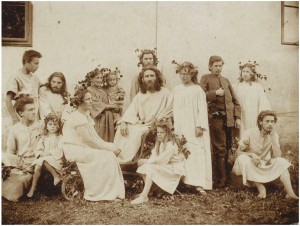As I washed the dishes by hand with some very pleasant Ecover natural washing-up liquid, having cooked some natural tofu with mushrooms in cold-pressed extra virgin olive oil, served with home-grown spinach and then home-made apple pie, I reflected that “natural” is a hard-working word.
The connotations of nature are perfect for marketing. Happy cows peacefully chomp lush green grass in a rolling hill country with a tree, a winding road, a gate, a hedge, blue sky and yellow sun, at least that’s how it looks on the side of the dairy product carton. Actually the cows are probably in a shed, the fields are very likely poached, muddy and puddled by hundreds of heavy feet, the sky lead-grey, and the hedges long since grubbed out to gain the hedge-grubbing efficiency subsidy. But hey! This is marketing. Nature to the rescue! Happy cows in pretty “natural” landscapes sell more yoghurt, specially when it’s low-fat organic natural Lactobacillus bifida yoghurt.
Clearly something unnatural is going on. Are the happy cows in a “state of nature”? Hardly. They belong to a farmer, who bought them in a market, or bred them via artificial insemination, browsing the online catalogue to choose the best bull for the farm’s soil, climate and breed of cow. The cattle themselves were bred to maximise productivity through many rounds of such artificial selection by farmers and animal breeders.
Well, is the yoghurt in a state of nature, leaving aside the unnatural state of the cows it came from? Did it go sour all by itself when its Palaeolithic minders left it in a bark bucket overnight, only to discover to their astonishment the next morning that it had somehow turned solid, acquired an interesting sour taste, but was actually nicer than the milk it had replaced? Well, that may once have happened, but it certainly wasn’t how the stuff got into that carton on that supermarket shelf today.
So, why’s it called “natural” yoghurt then? Oh, you mean because it’s plain, as opposed to being full of pineapple chunks with a minty flavour? Nature = Vanilla flavour? Well, that’s a useful meaning.
But if that’s what “natural” is, why is my washing-up liquid natural? It’s scented with camomile and mango, or turnip and artichoke, or something. Surely natural would mean unscented, just as it comes. Oh, you mean it’s natural because it’s not full of synthetic chemicals, the soap is all extracted by a team of a hundred doughty washerwomen with brawny arms, pounding bales of organically-grown soapwort with lye and goat’s urine to extract the natural saponins? No? You mean the saponins were extracted in a chemical factory? Doesn’t sound terribly natural to me.
And why are we praising the benefits of natural olive oil, is it inherently better than any other oil? Sure, we now know that hydrogenated vegetable oils aren’t too clever, that was a piece of processing too far. But the olive oil has been made from trees planted in rows in an orchard, weeded, sprayed if need be, pruned, harvested. The fruits have been soaked in brine, then crushed — that’s the first extra virgin cold pressing bit — to squeeze the oil out. It’s been put in tins or bottles and carted hundreds of miles to get here. It’s as natural as the pollen in a bumblebee’s leg baskets, in fact. Not.
Well, what about the tofu, the mushrooms, the home-made apple pie? Go on, it’s your turn, work out their life-histories for yourself. I’ll return your scripts to you next week.
So why are people claiming the epithet “natural” for all sorts of things? Part of it is a more-or-less deliberate confusion with the warm feelings we have for a lovely view, a nice day in the countryside, a holiday in the mountains: nature is somehow good and right. The happy cows in the mescaline-bright mock Dorset countryside on the dairy carton are tapping into this feeling about nature. Being natural makes a product warmer, cosier, safer, more familiar: separate from the nasty cold modern world of dairy processing plants and integrated supply chains. Only it doesn’t, really.
The marketing man’s deliberate sleight-of-hand is one thing: at least we know that’s his game, and we sophisticated consumers know to discount his warm fuzzy claims, don’t we? Possibly.
But there’s a worse confusion out there. “Natural” = good, beneficial, health-giving, right, even somehow spiritual. This was the basis of the whole round-about-1900 back-to-Mother-Nature movement, in which Karl Wilhelm Diefenbach and his proto-hippies in their Himmelhof (“Heaven House”) commune went about in flowing robes, barefoot, with flowers in their hair — yeah, you thought all that began in the 1960s — seeking to absorb goodness from Nature.

Well, nature may be flowery and pretty, but pufferfish tetrodotoxin is straight from nature, and one drop will kill you. Tree-frog curare arrow-poison, that paralyses your muscles so you fall down, conscious but helpless, is totally natural too. So is tetanus toxin, and food-poisoning and clostridium gas-gangrene toxin, and so is … Oh, that wasn’t the sense you intended? You didn’t mean that Mother Nature could kill as well as give life, you wanted to focus on the positive. Right. As long as you’re clear about it.
